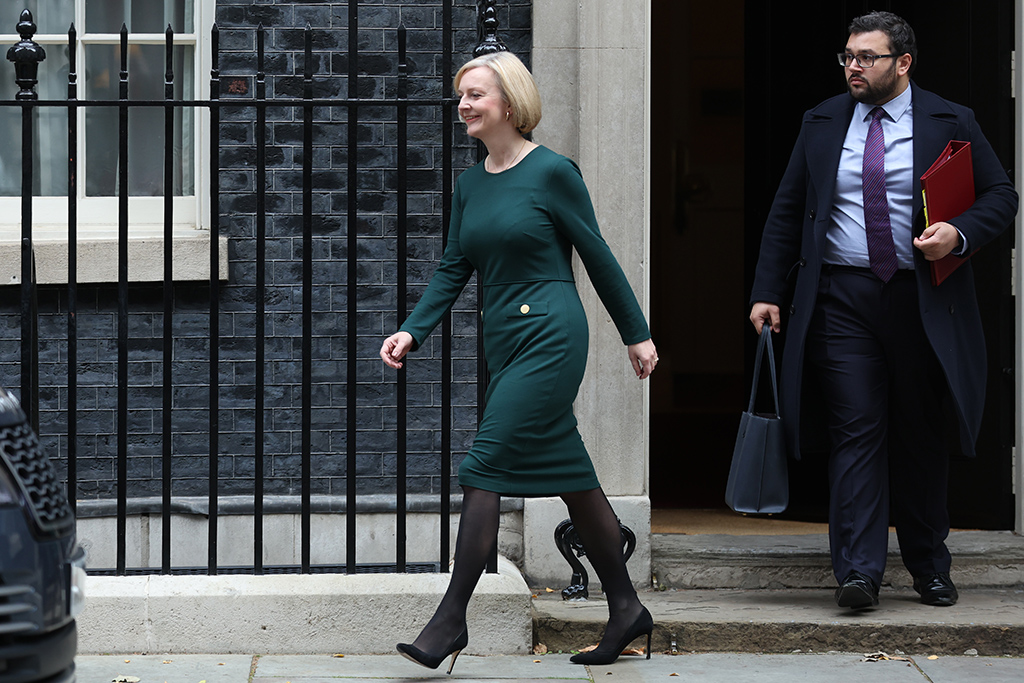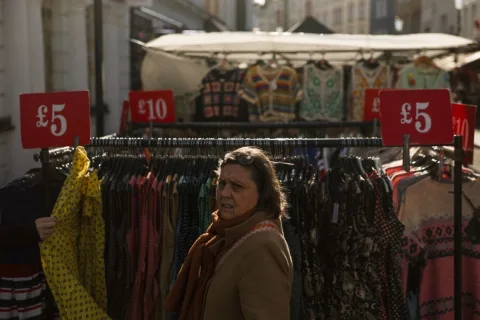LONDON: Britain's beleaguered Prime Minister Liz Truss vowed Wednesday not to cut public spending, once again defending last month's uncosted tax-slashing mini-budget that has sparked weeks of UK market turmoil. Appearing in parliament for the first time since the contentious September 23 plans prompted economic upheaval, Truss said she was "absolutely" committed to pledges made during the summer's Tory leadership campaign to maintain current spending.
With currency, bond and other markets spooked by the extra borrowing earmarked to pay for tax cuts, fears have grown that Truss will slash government department budgets, returning to the unpopular austerity policy of a decade ago. But the 47-year-old leader insisted that would not happen, while doubling down on her tax plans and reducing debt.
"What we will make sure is that over the medium-term the debt is falling," Truss told MPs, in only her second "Prime Minister's Questions" session in the House of Commons since succeeding Boris Johnson early last month. "We will do that not by cutting public spending but by spending public money well," she added. Her policies would "protect our economy," she argued.
Truss also insisted her controversial economic package announced by Chancellor of the Exchequer Kwasi Kwarteng to reduce several different taxes would result in "higher growth and lower inflation".
'Lost in denial'
But the initial impact from it has been uniformly negative. The pound has plunged to unprecedented lows against the dollar, while government borrowing and mortgage rates have spiraled. The Bank of England has been forced to make several emergency interventions in bond markets, while the economy unexpectedly shrank in August after slender growth the previous month amid a cost-of-living crisis and rocketing energy bills.
The Bank of England may decide to extend its emergency bond buying, despite governor Andrew Bailey warning that the intervention will end this week, the Financial Times reported Wednesday. The BoE has "signaled privately to bankers" of a possible extension if market turmoil "flares up" again over Britain's debt-fuelled budget, the FT said citing people briefed on discussions. Bailey had stated late Tuesday that bond investors have "three days left" until the bank phases out its bond-buying efforts on Friday.
The BoE has struggled to reassure investors after unveiling yet more measures to calm markets rocked by the UK government's recent tax-slashing budget.
Labour leader Keir Starmer accused Truss of being "lost in denial" and "ducking responsibility" as she refused to acknowledge the economic fallout from her policies, instead blaming global factors such as the war in Ukraine for unsettling markets. Media reports have suggested that the mini-budget-already watered down with the scrapping of plans to axe the top rate of tax-could be further revised during a line-by-line review.
But Truss's spokesman rubbished the claims immediately after her weekly House of Commons questions. "We are committed to the measures that the Chancellor set out in the growth plan," he told reporters. Truss was "firmly of the view that is the right approach to take to ensure we move away from low or no growth", he added.
Britain's economy unexpectedly shrank in August after slender growth the previous month, hit by the cost-of-living crisis and rocketing energy bills, official data showed Wednesday. Gross domestic product contracted by 0.3 percent in August, weighed down by production and services, the Office for National Statistics said in a statement.
That was worse than expectations of flat growth and followed anaemic expansion of 0.1 percent in July, downgraded from 0.2 percent growth. "The economy shrank in August, with both production and services falling back," said ONS chief economist Grant Fitzner.
Consumer-facing services contracted by 1.8 percent, with the largest falls in sports, amusement and recreation. "August's drop in GDP likely marks the start of a downward trend that will continue deep into next year," said Samuel Tombs, chief UK economist at research consultancy Pantheon Macro. "The drop was driven by a 1.8-percent month-to-month fall in output in consumer-facing services sectors, reflecting the intense real income squeeze on households."
Inflation in August hit 9.9 percent, holding close to a 40-year peak as energy bills rocket in fallout from the Ukraine war, in turn worsening the UK's cost-of-living crisis. The ONS added Wednesday that oil and gas production fell due to more North Sea summer maintenance than usual in the month, while there were notable declines in manufacturing.
The gloomy news comes amid market turmoil after Britain's recent debt-fuelled budget, which included a costly energy price freeze. And it also comes one day after the International Monetary Fund forecast a sharp slowdown for the UK economy, which it expects to decelerate from 3.6 percent this year to just 0.3 percent in 2023. - AFP











